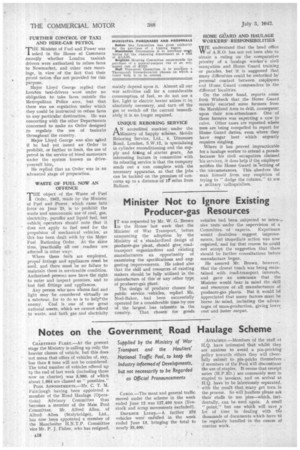FURTHER CONTROL OF TAXI AND HIRE-CAR PETROL
Page 20

If you've noticed an error in this article please click here to report it so we can fix it.
THE Minister of Fuel and Power was asked in the House of Commons recently whether London taxicab drivers were authorized to refuse fares to Newmarket, and other race meetings, in view of the fact that their petrol ration 'sins not provided for this purpose.
Major Lloyd George replied that London taxi-drivers were under no obligation to take fares outside the Metropolitan Police area, hut that there was no regulation under which they could be instructed to refuse fares to any particular destination. He was concerting with the other Departments concerned to make an Order designed to regulate the use of taxicabs throughout the country.
Major Lloyd George was also asked if he had yet issued art Order to prohibit, or futther to limit, the use of petrol in the service of hired motorcars under the system known as driveyourself hire, He replied that an Order Was in an advanced tage of preparation.
• WASTE OF FUEL NOW AN OFFENCE
THE object of the Waste of Fuel Order, 1942, made by the Minister of Fuel and Power, which came Into force on June 29, is to prohibit the waste and uneconomic use of coal, gas, electricity, paraffin and liquid fuel, but vehicle operators should note that it does not apply to fuel used for the propulsion of mechanical vehicles, as this has been dealt with by the Motor Fuel Rationing Order. At the same time, practically all our readers are affected in other wart.
Where these fuels are employed, prope? fittings and appliances must be used, and there must be no failure to maintain them in serviceable condition. Authorized persons now have the right to enter and inspect premises, and to test fuel fittings and appliances.
Any person who now whstes fuel and light may be considered virtually as a saboteur, for to do so is to help•the enemy. Coal is one of our great national assets, which wecannot afford .to waste, and both gas and electricity mainly depend upon it. Almost all our war activities call for a considerable consumption of fuel, so do not use a fire, light or electric heater unless it be, absolutely necessary, and turn off the gas or switch off the current immediately it is, no longer required.
UNIQUE REBORING SERVICE
AN accredited stockist under the Ministry of Supply scheme, Mobile Reboring Service, Ltd.. 4, 'Dinsmore Road, London, S.W,12, is specializing in cylinder recononing and the supply and fitting of starter gears. An interesting feature in connection with its reboring service is that the company sends out a van complete with the necessary apparatus, so that the jobs can be tackled on the premises of concerns up to a distance of 111 miles from Balham.
HOME GUARD AND HAULAGE WORKERS' RESPONSIBILITIES
W IE understand that the head office IN of A.R.O. has not yet been able to obtain a ruling on the comparative priority of a 'haulage worker's civil occucation and Home Guard training or parades, but it, is suggested that many difficulties could be smoothed by personal contact between employers and Home Guard commanders in the different localities.
On the other hand, reports come from Wisbech that the Home Guard recently escorted' some farmers from the Marshland Area to drill, consequent upon their non-attendance. One of these farmers was expecting a cow to calve. Other cases are reported where men are being compelled to report for Home Guard duties, even_ where they have sugar beet which urgently requires singling.
Where it has proved impracticable foe a haulage worker to attend a parade because his civil occupation claimed his services, it does help if the employer notifies the Home Guard in ...writing of the circumstances. This absolves the. man himself from any suspicion of trying to " dodge the column," to use a military -colloquialism.




















































